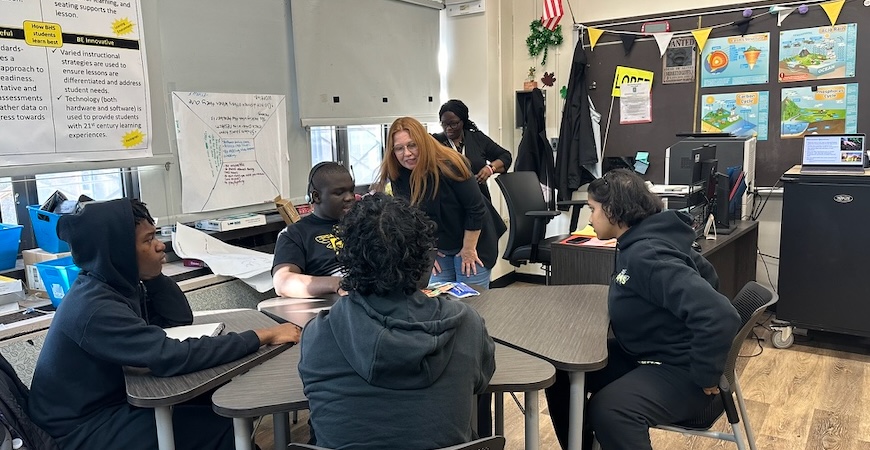
Recently, more than 150 students at 10 high schools in Los Angeles, New York City and Washington, D.C. completed Climate Justice, a UC Merced course , through a unique partnership between the University of California and the National Education Equity Lab.
Guided by its mantra, "Talent is evenly distributed, opportunity is not," the partners with leading universities across the United States to deliver select college courses for students at high schools in historically underserved communities nationwide.
Courses offered through the Lab challenge students to develop skills and habits that are markers of college readiness; the Lab also prepares students for future success in higher-ed learning environments by facilitating mentoring from university professors and graduate students. Students can earn high school credit and widely transferable university credit.
As part of President Michael Drake's priorities, the University of California in 2024 became the first university system to partner with the Lab. Following the success of Climate Justice, UC and the Lab are offering Bending the Curve: Climate Change Solutions this spring at six high schools in New York and Miami. UC plans to offer additional undergraduate courses through the Lab in the coming years.
Climate Justice is offered through the Department of Management of Information, Sustainability and Technology (MIST). Drawing inspiration from a long history of social justice movements, the course seeks to educate a new generation of climate justice changemakers through transformative lectures centering around intersectional equity issues and using a holistic systems perspective.
The course was designed by Professor Tracey Osborne, founding director of the UC Center for Climate Justice and Presidential Chair in the Management of Complex Systems Department at UC Merced. Lectures are organized across the six pillars of climate justice: Just Transition; Social, Racial and Environmental Justice; Indigenous Climate Action; Community Resilience and Adaptation; Natural Climate Solutions; and Climate Education and Engagement.
The course's content and academic rigor in the Lab offering are equal to that of the traditional course at UC Merced; the only difference is delivery. With Lab courses, high school students engage online once a week with "teaching fellows" - graduate and undergraduate students who contextualize content, run discussion sessions, develop and implement activities and solidify understanding. On the course's other days, teachers at the high schoolsfacilitate recorded lectures, individual assignments and engagement prompts, using a teaching guide developed as part of the course curriculum. Each week's content applies to the next week, and weekly assessments ensure understanding so that each week can build upon the previous one.
The UC instructional team consisted of faculty and graduate students from UCs Davis, Merced and Santa Cruz. Osborne served as founder and co-director with UC Davis Professor Julie Sze and UC Santa Barbara Professor Javiera Barandiarán. Sierra Nevada Research Institute researcher Deb L. Morrison was the project manager. Lupe Franco, UC Davis Ph.D. candidate in Geography, and Kristin Hogue, Ph.D. student in Cultural Studies at UC Davis, were responsible for in-class and virtual lesson plans and student interactions. Three undergraduate UC Merced students supported the course as readers.
The shift from in-person college courses for undergraduates to online college courses for historically underrepresented high school students came with challenges, but the affordances of the online opportunity more than made up for the obstacles.
"A lot of the students don't have stable internet," said Sze. "And some struggled with the assignments because it's college-level content. It's going to be hard. But overall, the students had an amazing experience. There were moments I would hear about in weekly meetings (with Franco and Hogue) where a lecture went really well and blew the students' minds."
Franco, who researches climate change and homelessness in California, was similarly impressed with the students' tenacity in the course.
"Being a part of high school students' experience taking a UC-level course on climate justice was incredibly rewarding, and an immense learning opportunity," she said. "It was fascinating to see how their diverse backgrounds shaped their lived experiences and how they connected the content to their own communities and the issues they faced locally. For instance, students from Southern California engaged differently than those from New York, as the climate change risks in their regions vary greatly."
She said navigating high school and the demands of a college-level program presented a steep learning curve for the enrolled students.
"It was crucial to consider everyone's capacity when developing lesson plans and providing support," she said. Franco and Hogue used a suite of online education tools supported through the Lab to scaffold the learning experience, including breaking down complex concepts into shorter parts with opportunities for reflection, offering regular office hours, and incorporating interactive activities regularly.
"Climate Justice is truly innovative, featuring lectures from leading faculty across the UC system working at the intersection of climate and equity," Osborne said. "It was an honor to share this important curriculum with high school students nationwide. The success of the course is a testament to our incredible instructional team - our teaching fellows, readers, the Center's Academic Coordinator and partners - who made the experience engaging, rigorous and meaningful for students."
Franco said the class was "more than just an academic experience. It was a space for students to engage deeply with real-world issues, reflect on their communities and develop a sense of agency in addressing climate justice."
She said she was surprised by how engaged the students were and how deep their insights were in connecting with the material.
"My hope is that the students leave feeling empowered to question everything, inspired to make a difference in the world and reassured that a future built on love, care and equity for everyone is possible," Franco said. "Most importantly, I hope they recognize they have the power to be a part of that change."